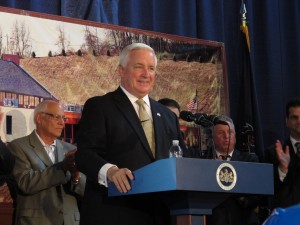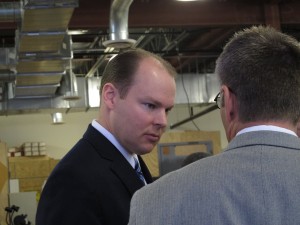What Happens Next On Corbett’s Impact Fee? That’s Up To Lawmakers
-
Scott Detrow
So, Governor Corbett has laid out his plan for a Marcellus Shale impact fee, and other measures.
What happens next? That’s up to the General Assembly.
The bulk of what Corbett announced today – an impact fee on drillers, extended buffer zones between wells and water sources, increased civil penalties for drillers who violate regulations – need to be passed by the House and Senate. During his Pittsburgh event, Corbett acknowledged lawmakers can, and usually will, make changes. ”Obviously this has to go through the legislature, and you know what that’s going to be like,” he told reporters.
The Corbett Administration doesn’t exactly have a tight bond with legislative leaders. The deck was stacked against Corbett, heading into office, given the fact he spent several years investigating the House and Senate in a wide-ranging corruption probe. Since January, legislative leaders have regularly groused about the lack of communication between the administration and their offices.
That trend began to change late in budget negotiations, when Corbett personally intervened at the last minute, to push a bill requiring referendum approval for property tax increases past the finish line.
Today, Corbett and his advisers sounded ready and eager to begin working with lawmakers on Marcellus Shale proposals. “There’s a lot of areas in his proposal that mirror, or replicate, or build upon outlines that many legislators have put forth,” said energy executive Patrick Henderson. “There are some difference of opinion, but I think we’re ready to have a debate and negotiations, and get this to the governor’s desk.”
The bulk of those negotiations will likely center around Corbett’s proposal to implement and collect fee revenue at the county level. ““The governor’s county-assessed fee approach will create a fragmented patch work of ‘have and have-not’ communities across Pennsylvania,” said Democratic Senator John Yudichak, who has emerged as a caucus leader on Marcellus Shale issues. In a phone interview, he noted Corbett is calling for “uniformity and consistency” across the state, when it comes to municipal ordinances regulating drilling. Simultaneously asking counties to assess and collect their own fees “is a huge contradiction,” he added in a phone interview.
In a tweet, House Democrat Tony Payton called the county-level fee a “stall tactic.”
Republican leaders share the concern. “I prefer a uniform statewide approach to a county by county approach,” Senate Majority Leader Dominic Pileggi told Capitolwire. House Majority Policy Chairman Dave Reed echoed Pileggi’s assessment. “I do think you want to structure it in a way that it is uniform across the board. A set fee and set distribution where counties are either in or out,” he told the website.
Speaking to StateImpact, another top Republican privately wondered whether a county-level levy would cut into the $120 million statewide haul Corbett estimates a fee could bring in. Some counties, he argued, may not implement the assessment.


















